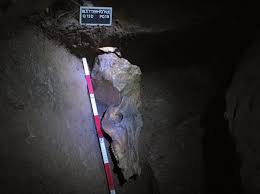In modern society, conflict is expected. One can hardly walk through a supermarket, let alone use the internet, without encountering an onslaught of minimally malaise, and often discrimination and violence. Much in the Archaeological record suggests that the history of humankind has similar violent overtones, but that the advent of warfare occurred simultaneously with the genesis of agriculture; while most societies were hunter-gatherers, there was relatively little to fight over. As a hunter-gatherer, an individual needs only their band, their health, and an area to move through as the seasons change and some resources are spent. However, in order to produce viable crops, a farmer must have land, sufficient rainfall or irrigation, implements, and most likely some form of permanent or semi-permanent structure. It is not surprising, then, that many archaeologists adhere to the theory that most hunter-gatherer societies died out around the time that agriculture was established, due to either adaptation to agriculture, or warfare.
A recent study conducted by the Institute of Anthropology at Johannes Gutenberg University Mainz suggests that the reality may not have been quite so simple. A team of archaeologists led by Professor Joachim Burger recently investigated the Blätterhöhle cave, in which both indigenous hunter-gatherers and immigrant agriculturalists are buried. They found remains in the cave which, paired with the other research that Burger has conducted, offer significant evidence that farmers and hunter-gatherers not only coexisted, they did so for quite some time (Science Daily).
Most people living in central Europe were hunter-gatherers, until approximately 7,500 years ago. Around this time, immigrant farmers brought agricultural practices to the area. Contrary to common belief, these farmers coexisted with the indigenous hunter-gatherers for at least 2000 years (Academia.edu).
This is a compelling story of coexistence over warfare. Archaeology has shown us that even in a situation where people were exposed to a totally different culture from the only society they had ever known, people were able to adapt and compromise. That an outside group was able to exist comfortably enough with the indigenous population that many of both were buried in the same cave speaks volumes about the benefits of accepting cultural difference. In more contemporary history, many societies have been unwilling to adapt to others in any way, as evidenced by the violence and strife that seem to be synonymous with living in a post-industrial society. However, as this example indicates, humans don’t have to interact that way. Coexistence is possible. We just have to be willing to accept differences without anger, and be willing to adapt as our environment and neighbors change.
Information:
Image Sources:
Natural Sciences (Image 1 and 3)
Anthroscape (Image 2)
Additional Information:




Cultural differences in the structure of an economic system of a group of people historically has been a causal mechanism of warfare. Understanding and adaptation to practices that are not typically part of one’s culture, demonstrates behavior that humans exhibited forms of compassion and compromise that eventually led to a sense of peace. Not that warfare was completely eradicated from humankind, but that justice possibly was more important than conflict.
While I do agree with your point that justice is more important than conflict, I think that there may be a more pragmatic reason for co-existence in this situation. It would be rather beneficial for the hunter-gatherers to attempt co-existing because agriculture provides a consistent flow of food. However, I do wonder how these agriculturalists handled the seasons. It may be that the hunter-gatherers aided these agriculturalists by finding a way to overcome the winter while the agriculturalists provided food for the other seasons. And from this mutual dependence for survival, compassion and understanding may have arisen. However, this is just speculation.
I strongly agree that understanding and adapting to new information is a crucial step in the pursuit of peaceful relations. I would disagree, though, that justice was more important than conflict in this particular situation. I believe that the peaceful (albeit somewhat uneasy) relations that existed during this time were much more tied to a mutual need for coexistence, as there is evidence that those who married into the other community may have been shunned. This seems to suggest that rather than simply accepting cultural differences easily, both communities tolerated the other for the sake of preventing warfare. Still, there is much from this that contemporary societies should consider applying to international relations: even if mutual respect cannot easily be reached, coexistence is a much more sustainable state than warfare.